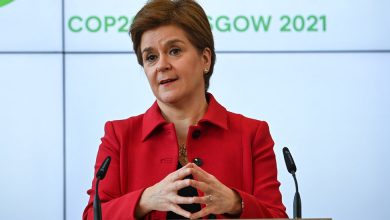The Path Ahead for Biden: Overcome Manchin’s Inflation Fears

WASHINGTON — Senator Joe Manchin III, the West Virginia Democrat, effectively killed President Biden’s signature domestic policy bill in its current form on Sunday, saying he was convinced the spending and tax cuts in the $2.2 trillion legislation will exacerbate already hot inflation.
Economic evidence strongly suggests Mr. Manchin is wrong. A host of economists and independent analyses have concluded that the bill is not economic stimulus, and that it will not pump enough money into consumer pocketbooks next year to raise prices more than a modest amount.
The reason has to do with the pace at which the bill spends money and how much it raises through tax increases that are intended to pay for that spending. The legislation spends funds over a decade, allowing the taxes it raises on wealthy Americans and businesses, which will siphon money out of the economy, to help counteract the boost from spending and tax cuts.
The bill also does not provide the type of direct stimulus included in the $1.9 trillion pandemic aid package Mr. Biden signed in March — and which Mr. Manchin supported. Some of its provisions would give money directly to people, like a continued expanded child tax credit, but others would fund programs that would take time to ramp up, like universal prekindergarten.
Economists say the net result is likely to be at most a tenth of a percentage point or two increase in the inflation rate. That would be a relatively small effect at a time when supply chain crunches, surging global oil demand and a pandemic shift among consumers away from travel and dining out and toward durable goods have combined to raise the annual inflation rate to 6.8 percent, its fastest pace in nearly 40 years.
For months, Mr. Manchin has warned the president and congressional leaders that he was uncomfortable with the breadth of what had become a $2.2 trillion bill to fight climate change, continue monthly checks to parents, establish universal prekindergarten and invest in a wide range of spending and tax cuts targeting child care, affordable housing, home health care and more. He has cited both the risks of inflation and his fear that the package could further the balloon the federal budget deficit, saying several programs that are now estimated to end in a few years would likely be made permanent.
Over the past week, he has insisted that the bill shrink to fit the framework of less than $2 trillion that Mr. Biden announced this fall, and that — crucially — the legislation not use budget gimmicks to artificially lower the bill’s effect on the budget deficit.
In a statement on Sunday, Mr. Manchin said Democrats “continue to camouflage the real cost of the intent behind this bill.”
White House officials have tried to promote the idea that the bill would reduce price pressures right away — an outcome economists have not entirely bought into. But the general economic consensus finds little evidence to suggest the bill risks exacerbating rising food, gasoline and other prices.
Today’s inflationary surge stems from a confluence of factors, many of them related to the pandemic. The coronavirus has caused factories to shutter and clogged ports, disrupting the supply of goods that Americans stuck at home have wanted to buy, like electronics, televisions and home furnishings.
That high demand has been fueled in part by consumers who are flush with cash after months of lockdown and repeated government payments, including stimulus checks. Research from the Federal Reserve has shown that inflation is most likely getting a temporary increase from the coronavirus relief package in March, which included $1,400 direct checks to families and generous unemployment benefits. But Mr. Biden’s social policy bill would do relatively little to spur increased consumer spending next year and not enough to offset the loss of government stimulus to the economy as pandemic aid expires.
White House aides have tried to make that case to Mr. Manchin — and the public — in recent weeks, pointing to a series of analyses that have dismissed inflationary fears pegged to the bill. That includes analysis from a pair of Democratic economists who warned about rising inflation earlier this year — Harvard’s Lawrence H. Summers and Jason Furman — and from the nonpartisan Penn Wharton Budget Model at the University of Pennsylvania. All of those analyses conclude that the bill would add little or nothing to inflation in the coming year.
The disconnect between economic reality and Mr. Manchin’s stated concerns has exasperated the White House, which is struggling with voter discontent toward Mr. Biden over rising prices, as well as an unyielding pandemic.
In a scathing statement about Mr. Manchin on Sunday, the White House press secretary, Jen Psaki, noted that the Penn Wharton analysis found Mr. Biden’s bill “will have virtually no impact on inflation in the short term, and in the long run, the policies it includes will ease inflationary pressures.”
White House officials, who along with party leaders have spent weeks trying to bring Mr. Manchin to a place of comfort with Mr. Biden’s bill, registered a sense of betrayal after the senator’s declaration.
Ms. Psaki said Mr. Manchin had last week personally submitted to the president an outline for a bill “that was the same size and scope as the president’s framework, and covered many of the same priorities.” He had also promised to continue discussions toward an agreement, she said.
Republicans celebrated Mr. Manchin’s statement as evidence that the bill, which Democrats were attempting to pass along party lines, was full of inflationary policies that even the president’s own party could not get behind.
Biden’s Social Policy and Climate Bill at a Glance
The centerpiece of Biden’s domestic agenda. The sprawling $2.2 trillion spending bill aims to battle climate change, expand health care and bolster the social safety net. Here’s a look at some key provisions and how they might affect you:
Child care. The proposal would provide universal pre-K for all children ages 3 and 4 and subsidized child care for many families. The bill also extends an expanded tax credit for parents through 2022.
Paid leave. The proposal would provide workers with four weeks of paid family and medical leave, which would allow the U.S. to exit the group of only six countries in the world without any national paid leave. However, this provision is likely to be dropped in the Senate.
Health care. The bill’s health provisions, which represent the biggest step toward universal coverage since the Affordable Care Act, would expand access for children, make insurance more affordable for working-age adults and improve Medicare benefits for disabled and older Americans.
Drug prices. The plan includes a provision that would, for the first time, allow the government to negotiate prices for some prescription drugs covered by Medicare.
Climate change. The single largest piece of the bill is $555 billion for climate programs. The centerpiece of the climate spending is about $320 billion in tax incentives for producers and purchasers of wind, solar and nuclear power.
Taxes. The plan calls for nearly $2 trillion in tax increases on corporations and the rich. The bill also raises the cap on how much residents — particularly in high-tax blue states — can deduct in state and local taxes, undoing the so-called SALT cap.
Still, Mr. Manchin’s concerns leave the White House at least the possibility of a path forward, albeit not the one Mr. Biden set out to travel. Some Democrats and administration officials believe there is still a chance to recast the bill to suit Mr. Manchin’s demands, and to possibly pass it in the early months of next year.
The result would be a bill that would also be unlikely to fuel inflation next year — but which would be smaller. The number of programs it would contain would shrink, and it would include funding over the next 10 years to pay for the spending.
Such changes would force the White House to once again make difficult choices about which party priorities to leave on the cutting room floor.
Mr. Biden began the year with a $4 trillion agenda to overhaul the government’s role in the economy, fight climate change and invest in America’s children. He sliced off some of it for a bipartisan infrastructure bill he signed into law this fall, and has whittled down the rest in negotiations with moderates and progressives in his party, which controls the House and Senate by exceedingly narrow margins.
As they scaled back the bill, Democratic leaders had essentially two choices. They could focus on a few programs, like tax credits for climate change, an expanded benefit for parents that is meant to fight child poverty and making pre-K free for 3- and 4-year-olds across the country. Or they could pack as many programs as possible into the bill, setting some of them to expire after as little as a year to avoid ballooning the budget deficit, and hope that lawmakers would extend them in the future.
Leaders chose the “pack-it-in” strategy, in part because so many interest groups in their coalition, like environmentalists and labor unions, had competing priorities. Budget hawks urged a more targeted approach: fewer programs that were made permanent to avoid playing budget games that could fuel the deficit down the road.
Mr. Manchin, who is perhaps the most prominent deficit hawk in the Democratic Party, worried that temporary spending would become permanent without offsets, adding to the debt. Republicans stoked his fears by asking the Congressional Budget Office to analyze an imaginary bill in which every program was permanent, which showed ballooning deficits as a result.
White House officials pushed back hard on those projections, insisting that Mr. Biden would not extend any programs without offsets. But Mr. Manchin appears to have been unmoved.




